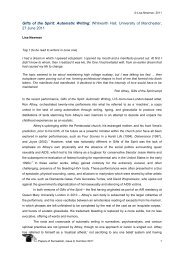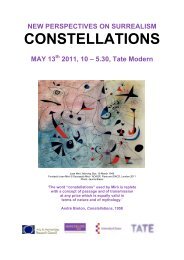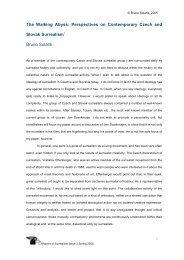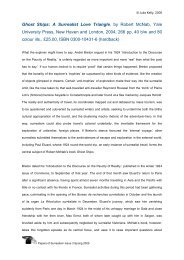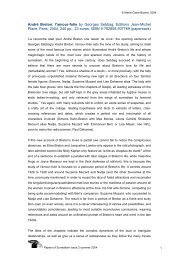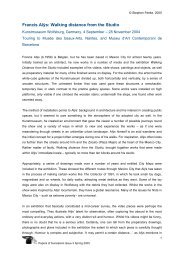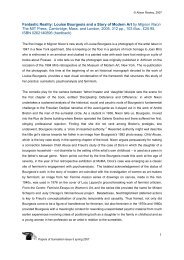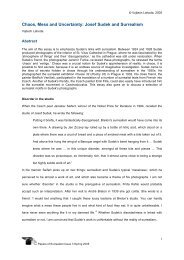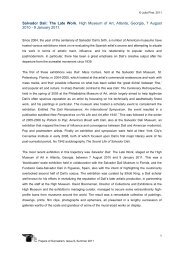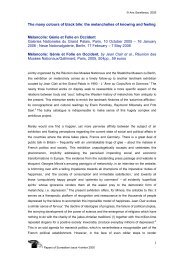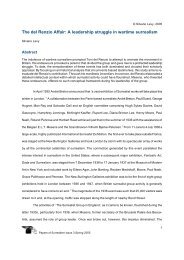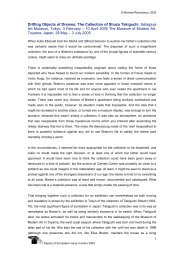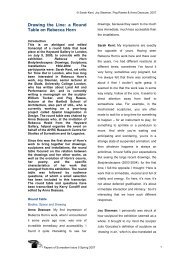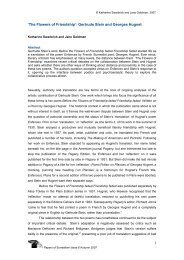From the Walls of Factories to the Poetry of the Street: Inscriptions ...
From the Walls of Factories to the Poetry of the Street: Inscriptions ...
From the Walls of Factories to the Poetry of the Street: Inscriptions ...
You also want an ePaper? Increase the reach of your titles
YUMPU automatically turns print PDFs into web optimized ePapers that Google loves.
© Caroline Levitt, 2011<br />
Apollinaire has <strong>of</strong>ten been viewed as a precursor <strong>to</strong> <strong>the</strong> later movement. 5 Previous authors<br />
have examined relationships between Apollinaire and surrealist protagonists, have considered<br />
Apollinaire‟s reinvention <strong>of</strong> poetic technique and, importantly, have scrutinised Apollinaire‟s coining <strong>of</strong><br />
<strong>the</strong> term „surréaliste‟ in 1917 and his use <strong>of</strong> it in <strong>the</strong> subtitle <strong>of</strong> his play Les Mamelles de Tirésias:<br />
Drame surréaliste. In contrast <strong>to</strong> such comparisons between <strong>the</strong> surrealisms <strong>of</strong> Apollinaire and<br />
Bre<strong>to</strong>n, which rely on an apparent similarity that turns out after all <strong>to</strong> be in many ways ra<strong>the</strong>r<br />
dissimilar, this article will bring out new and unexpected points <strong>of</strong> encounter through <strong>the</strong> use <strong>of</strong> graffiti<br />
as a means <strong>of</strong> substantiating <strong>the</strong> underlying ideologies that tie so many surrealist innovations back <strong>to</strong><br />
Apollinaire. In so doing it will bring <strong>to</strong> <strong>the</strong> debate a fresh methodology through looking in depth at<br />
certain hi<strong>the</strong>r<strong>to</strong> neglected texts that pertain <strong>to</strong> <strong>the</strong> overarching <strong>the</strong>me, broadening <strong>the</strong> possibilities for<br />
future considerations <strong>of</strong> Apollinaire in relation <strong>to</strong> surrealism.<br />
Transgression and liberation<br />
In 1911, Apollinaire had spent four days in La Santé prison, accused <strong>of</strong> abetting <strong>the</strong> <strong>the</strong>ft <strong>of</strong> some<br />
Iberian statuettes from <strong>the</strong> Louvre. 6<br />
Writing for Paris-Journal on 14 September <strong>of</strong> that year, he<br />
described his experience, commenting that „<strong>the</strong> first violent emotion that I felt at La Santé came from<br />
an inscription engraved in<strong>to</strong> <strong>the</strong> metal <strong>of</strong> <strong>the</strong> bedstead: “Dédé de Ménilmontant for murder.”‟ 7 The next<br />
day‟s issue <strong>of</strong> <strong>the</strong> same journal contained Apollinaire‟s transcription <strong>of</strong> a poem he had found, on <strong>the</strong><br />
back <strong>of</strong> a piece <strong>of</strong> paper detailing prison rules, left by ano<strong>the</strong>r prisoner: Myriès <strong>the</strong> singer. This, as<br />
Apollinaire explains in <strong>the</strong> 14 September article, inspired him <strong>to</strong>o <strong>to</strong> while away <strong>the</strong> hours and<br />
overcome in part „l‟absence de la liberté‟ („<strong>the</strong> absence <strong>of</strong> liberty‟) by writing. The resultant group <strong>of</strong><br />
poems, „À la Santé,‟ was later published in <strong>the</strong> volume Alcools (1913). The fourth and sixth poems<br />
pick up <strong>the</strong> <strong>the</strong>me <strong>of</strong> graffiti in <strong>the</strong> following terms:<br />
I am so bored between <strong>the</strong>se naked walls …<br />
I listen <strong>to</strong> <strong>the</strong> sounds <strong>of</strong> <strong>the</strong> city<br />
and, prisoner without horizon<br />
I see nothing but a hostile sky<br />
and <strong>the</strong> bare walls <strong>of</strong> my prison. 8<br />
The bare walls <strong>of</strong> <strong>the</strong> interior <strong>of</strong> <strong>the</strong> prison contrast starkly with <strong>the</strong> exterior walls <strong>of</strong> <strong>the</strong> rue Ber<strong>to</strong>n,<br />
covered in writing, and <strong>the</strong> relationship between writing and imprisonment or liberation is an important<br />
one. For Apollinaire, <strong>the</strong> bare walls are representative <strong>of</strong> boredom and incarceration, whereas<br />
inscriptions, be <strong>the</strong>y on <strong>the</strong> walls <strong>of</strong> <strong>the</strong> rue Ber<strong>to</strong>n or on <strong>the</strong> bedstead <strong>of</strong> his cell, free <strong>the</strong> imagination,<br />
provoking interest, inspiration and emotion. On <strong>the</strong> one hand, it is <strong>the</strong> transgressive actions behind<br />
<strong>the</strong> words that Apollinaire finds at La Santé that are important: defacing <strong>the</strong> crude furniture that<br />
belongs <strong>to</strong> <strong>the</strong> authorities and overwriting rules with poetry are exploits that epi<strong>to</strong>mise <strong>the</strong> illicit nature<br />
<strong>of</strong> graffiti. On <strong>the</strong> o<strong>the</strong>r hand, <strong>the</strong> very act <strong>of</strong> writing is <strong>the</strong>n <strong>the</strong> thing that enables Apollinaire <strong>to</strong> free<br />
his own mind and makes his imprisonment more bearable. We are not <strong>to</strong>ld on what surface<br />
Apollinaire pens his poems, but it seems likely that this is again something that is <strong>to</strong> hand ra<strong>the</strong>r than<br />
something that is intended for <strong>the</strong> purpose. Writing as an exercise in liberation and as a transgression<br />
<strong>of</strong> convention and logic was at <strong>the</strong> core <strong>of</strong> surrealism‟s literary origins.<br />
Papers <strong>of</strong> Surrealism, Issue 9, Summer 2011 3



